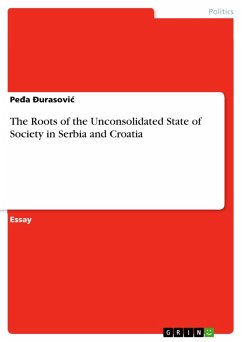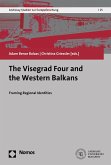Essay from the year 2017 in the subject Politics - Topic: Development Politics, grade: B, Leuphana Universität Lüneburg, language: English, abstract: This paper aims to analyse the societies in Serbia and Croatia. After Yugoslavia fell apart in the 1990s, its two republics, Croatia and Serbia, continued their paths through the transition process as independent countries. Croatia is already a member state of the European Union, by evaluating the condition of Croatian society it derives that Croatia cannot be considered as a completely consolidated state. On the other hand, Serbia is currently struggling to adopt the societal and state system which would meet the requirements of a fully transformed country. The current position of both countries has largely been defined by Serbian-Croatian mutual relations over the past 25 years. Socialist Federal Republic of Yugoslavia (Yugoslavia) was, after a few constitutional changes that were conducted in its political history, the last known name of a country which consisted of six republics (Slovenia, Croatia, Bosnia and Herzegovina, Serbia, Montenegro and Macedonia) and two autonomous provinces (Vojvodina and Kosovo) as the constitutional parts of its one republic (Serbia). As regards the constitutional framework, Yugoslavia, after the end of World War II, was constituted as a federation of republics, politically arranged as a one party system (autocratic regime) governed by the Yugoslavian Communist Party. In 1991, at the time when huge changes occurred in Europe and when all the communist regimes in Central and Eastern Europe fell down, the first multiparty elections were held in Yugoslavia after which its two republics Croatia and Slovenia declared their independence from Yugoslavia. Also, at the time two leading political figures in Yugoslavia, MiloSevic and Tudman, the president of the Republic of Serbia and the president of the Republic of Croatia respectively, met each other in the place in Northern Serbia named Karadordevo and shaked hands for the first time. The second time they shaked hands was in 1995 in Dayton (USA) when the Dayton Peace Agreement was signed which ended the war in Bosnia and Herzegovina.
Dieser Download kann aus rechtlichen Gründen nur mit Rechnungsadresse in A, B, BG, CY, CZ, D, DK, EW, E, FIN, F, GR, HR, H, IRL, I, LT, L, LR, M, NL, PL, P, R, S, SLO, SK ausgeliefert werden.









